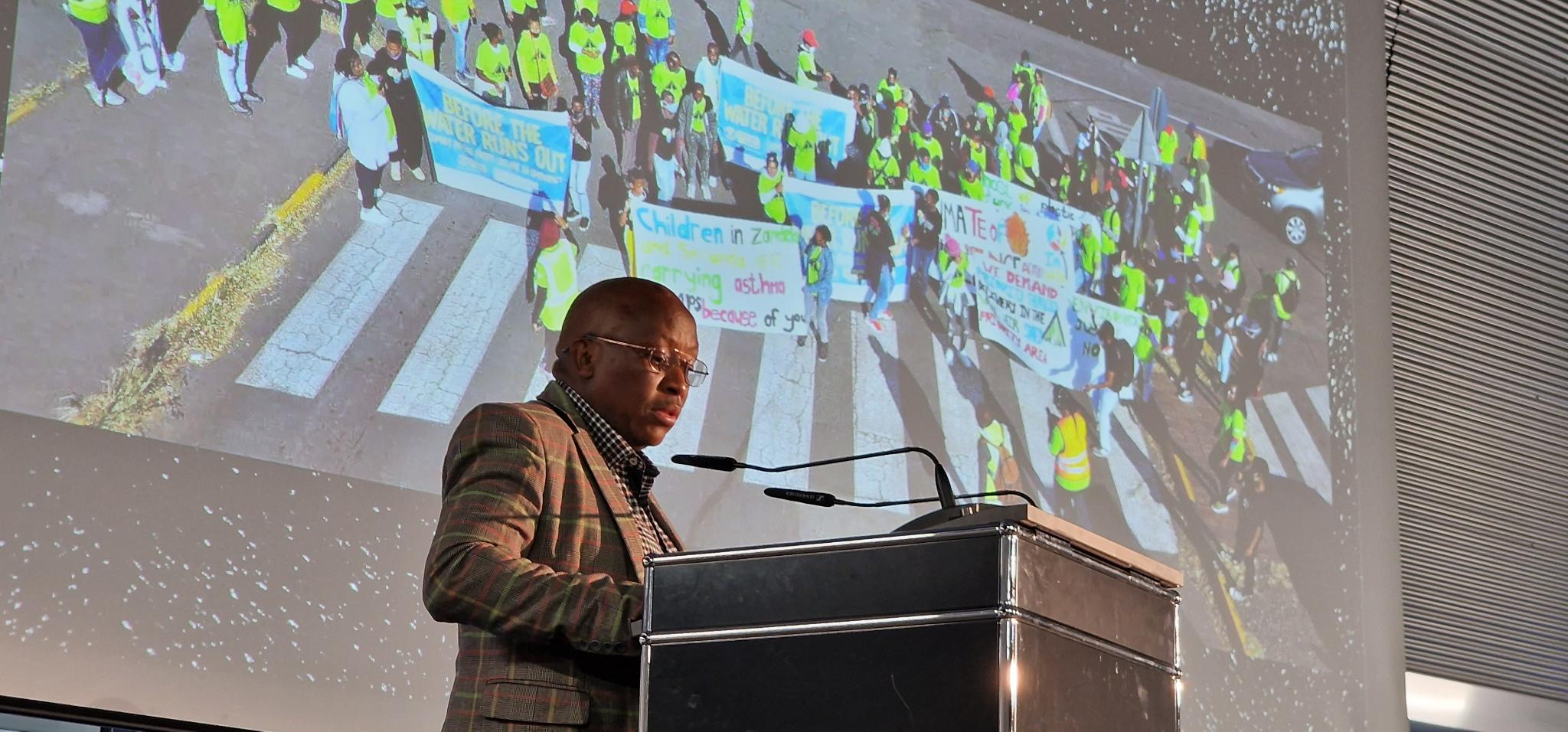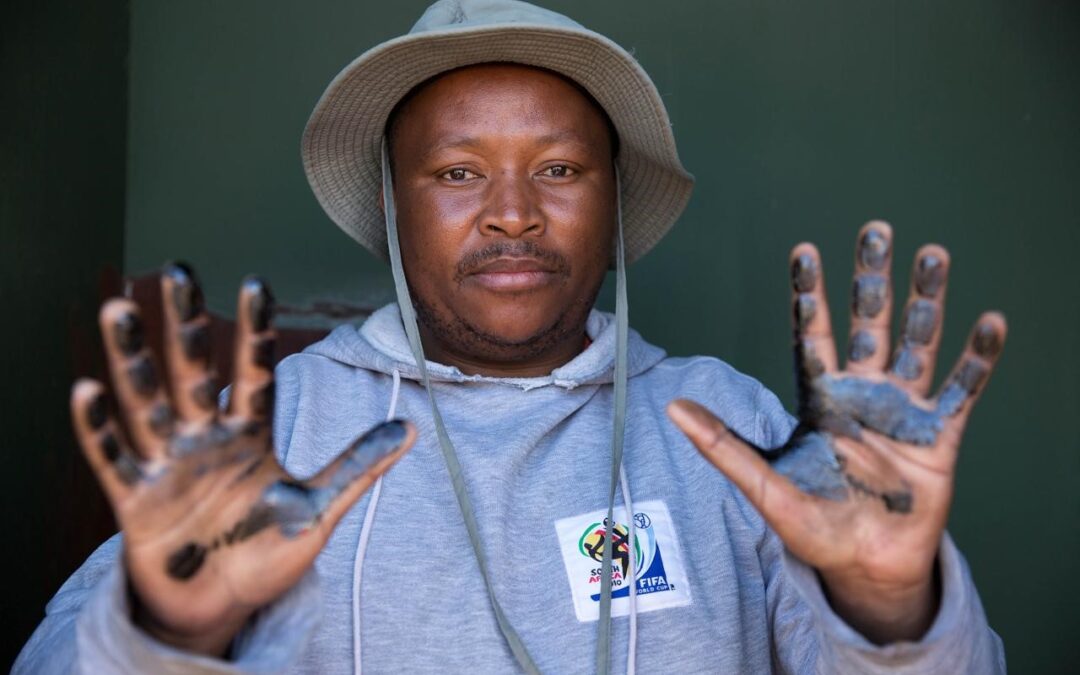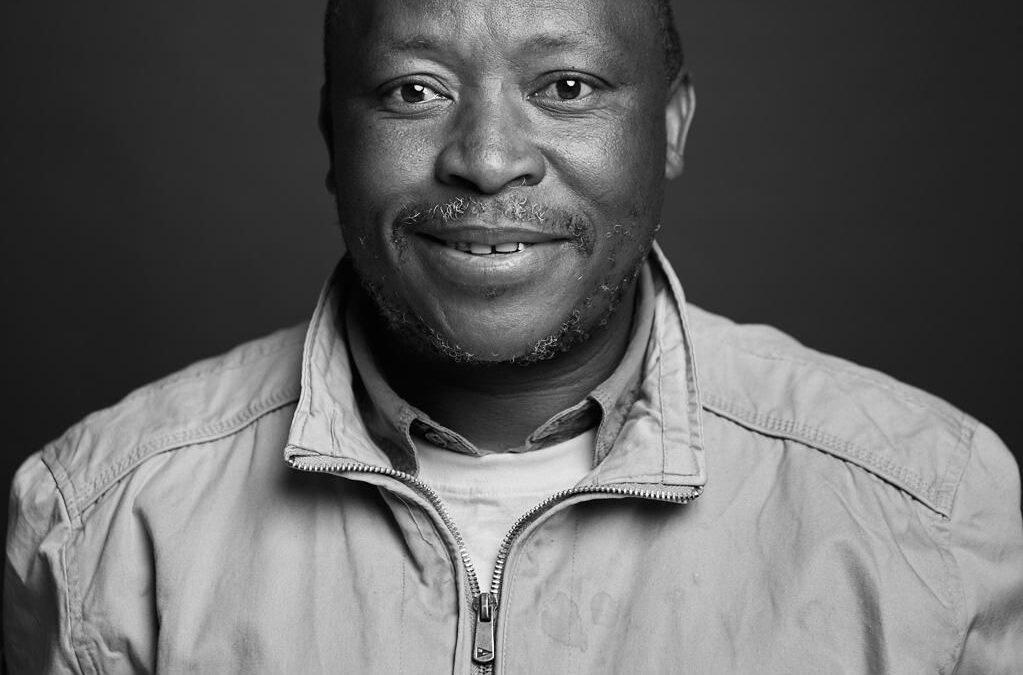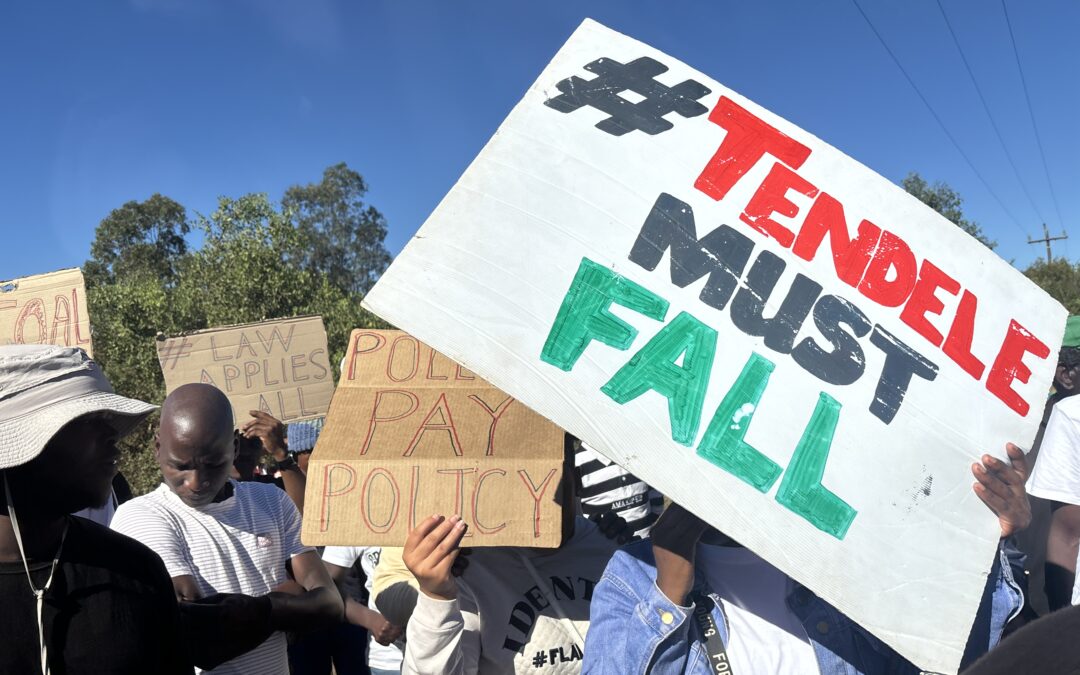
A tribute to the life of Samson Mokoena (2 August 1976 – 28 June 2024)
by Bobby Peek
A couple of weeks before the World Summit on Sustainable Development in 2002, I got a call from Samson Mokoena, who introduced himself via his links with environmental justice activists in Sasolburg, Earthlife Africa and Professor Jacklyn Cock. He’d heard that groundWork was going to host an event calling for corporate accountability the week before the Summit, together with global and local partners, to challenge governments and corporates. He wanted in on it. He had a story to tell. A story of a struggle against the apartheid created steel giant, Iscor, which subsequently became ArcelorMittal. And so it was that late on a Monday afternoon the week before the Summit, that Samson walked into the Balalaika Hotel, opposite the South Africa Stock Exchange, and introduced himself.
He was a young radical, and so he remained until last week, when I heard the news of his early departure at the age of 47. We often laugh about how the politik in South Africa interprets youth. But in Samson, it lived in a real space where there was real meaning. As Cock puts it in her reflections on the struggle for environmental justice in South Africa, Samson and those with him in the local struggle against the neighbouring steel giant, radicalised environmental justice. Indeed, Samson was, and always will be part of the long tradition in South Africa, of local community organising and challenging for environmental justice to be real, to be on the streets, to be at the fence lines of corporate pollution and power where they operate, and at the headquarters where decisions are made. Environmental justice is not only about NGOs in cities. Samson demanded that we be on the ground in struggle. He made this demand in person, from Johannesburg to Paris, from Durban to Luxembourg, from Cape Town to Conakry.
Samson made sure we heard the hard questions and his thoughts, which forced us to interrogate our actions. I cannot forget how he challenged me to explain why I think that sitting on the Presidential Climate Commission helps those in struggle on the ground. It was not an easy debate; but it was one he demanded we have. He would just not accept that it delivered to people on the ground. He wanted to see real change under his feet, not writings and meetings in Johannesburg and on Zoom. He wanted us to deliver actions on the ground. He never gave up on these demands.
His tenacity was evident in the Vaal Environmental Justice Alliance (VEJA), the local organising entity that he led, since the early 2000s. The Alliance is a space where many local organisations come together to strengthen the environmental justice struggle – by bringing food struggles together with worker struggles, health struggles together with waste struggles, energy struggles together with education struggles, land struggles together with water struggles. This is where, long before the Presidential Climate Commission, people knew that by joining struggles we can work towards just transition.
Samson’s drive and energy demanded that NGOs work with local struggles. And he gave real meaning to this. In the early days of the Centre for Environmental Rights, groundWork linked Samson and the Alliance with the Centre, and through a couple of years of strategic campaigning, we took on ArcelorMittal. For far too long, CEOs at ArcelorMittal had kept evading the question of handing over information which, according to our Constitution, belongs in the public domain.
In 2014, the Supreme Court of Appeal upheld a High Court decision that a “requester must be given access to any record of a private body if – (a) that record is required for the exercise or protection of any rights” and that “corporations operating within our borders, whether local or international, must be left in no doubt that in relation to the environment in circumstances such as those under discussion, there is no room for secrecy and that constitutional values will be enforced.” After many years of going nowhere slowly, ArcelorMittal (and the sleeping State) had to handover 8000 pages of information on historic pollution. This has laid the foundation for the real meaning of freedom of information and open democracy.
NGOs from all over the world came to visit the Alliance and met with Samson and those in struggle. Their long-time funding partner, the Global Greengrants Fund often visited and shared the Alliance’s strong organising praxis with other grantees they were supporting. Friends of the Earth International and Bankwatch linked local struggles to ensure that communities in Liberia, India, Bosnia-Herzegovina, Kazakhstan, Romania, and the Czech Republic learnt from the experience of local organising. Over the last two years, Samson and the Alliance have hosted and engaged with community and NGO activists from Guinea supported by the 11th Hour project. And one of the learnings from a community member from Guinea, which is articulated in a short documentary to be released in the next month, is about the power of local people and organising; the power of not having to depend on NGOs in big cities, and that people have power at a local level. Indeed, this is the evidence constantly demonstrated by Samson and the Alliance.
Samson was a strategist of note from the early days of his environmental justice activism. Often, he mentioned that this strategy came from organising against the apartheid state. At the Balalaika Hotel, as the world was gathering in Sandton to pat themselves on the back for their Greenwashing – the phenomenon of socially and environmentally destructive corporations attempting to preserve and expand their markets by posing as friends of the environment and leaders in the struggle to eradicate poverty – Samson’s strategic approach demanded that we protest at the Iscor annual general meeting which was being held just down the road. I said, “Samson, we have not applied for permission yet, and there are cops all over the show.”
“Exactly!” he replied, “They will not be expecting us to protest in the space they think they own.”
So, protest we did, and we halted the meeting with our noise from the entrance of the hotel where the AGM was being held. To quell the noise and protest we were invited inside. We refused, as we had not been invited in the first place. We were demanding to be heard, and indeed we were. Local security on site did not know how to respond, and as a helicopter hovered above, the police finally arrived, confused that this had slipped through their system. Action had to be taken, and while they were still puzzling about what to do, we slipped out and away. Our point was made.
Samson was also a quick thinker. At a gas masterplan meeting where the government and gas industry were concocting a strategy for gas in the country, designating swathes of land as ‘gas corridors’ without people’s consent, Samson asked the expert consultant running the process if he had visited the towns on the map showing the corridors. The answer was no. The meeting went berserk.
In South Africa, organisations and movements including the Environmental Monitoring Group, Oxfam, 350.org, Greenpeace, Alternative Information Development Centre, Khanya College, Heinrich Böll Foundation, Mining Affected Communities United in Action, Benchmarks, and many others all demanded time from Samson and the Alliance. It is incumbent upon all of us, that we not only demand time from local community organisations and activist, but that we stay with these struggles for the long haul, for the good times and the bad. As NGOs and movements, we must never allow our activism to be outsourced to voluntarism on the ground. We need to resource local struggles in order that communities can define their own trajectories, even if this means that we, as NGOs, are challenged.
Working with Samson as an activist, you often realised that he was forever on the move – making things happen and demanding that others act. This did not always go down well with others in the struggle. Being a justice activist in a post-apartheid South Africa was not easy. The links with old political comrades often blurred the lines – although no more. But being an activist, Samson demanded good governance, and our participation in governance processes from air quality committees as a local level to participation national parliament.
Activists are not meant to be managers of process and systems, and indeed that is where my friend Samson fell short. And I often feel that I failed in him. We cannot overlook the need for care, for community organisations to be supported, not only administratively and financially, but by fortifying the health and wellbeing of the people involved in struggle organisations and movements.
May we learn from, and cherish, all that Samson Mokoena gave us, during his short life.
And finally thank you to his family, especially Jason and Musi, his young children, for having allowed their father the time to be a remarkable leader in the struggle.
Bobby Peek is the Executive Director of groundWork, Friends of the Earth South Africa.
ends………………….
For information please contact:
Dorothy Brislin, Senior Communications Campaigner at groundWork 082 319 3741 , cc
Images of Samson Mokoena (please note credit in folder):
https://drive.google.com/drive/folders/1U2Pwf9CQS0FUcHonPTOkHGAo8YntT5c9?usp=drive_link
Announcements:
- The funeral will take place on Saturday 6th July 2024 in the Vaal
- Partners in the #LifeAfterCoal campaign, groundWork, friends of the Earth South Africa, Centre for Environmental Rights and EarthLife Africa with VEJA will arrange an online memorial service. The timing and registration details for this will be announced soon.
- The Environmental Justice Fund has set up a BackaBuddy campaign to raise and process funds for immediate support to Samson’s family for funeral costs, and thereafter to set up an educational trust for his children. https://www.backabuddy.co.za/campaign/in-memory-of-comrade-samson-mokoena



